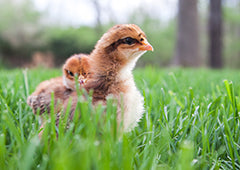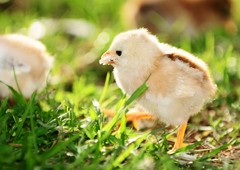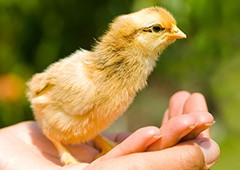Preparing to take care of baby chickens is a serious commitment, a lot like having a baby of your own, only less terrifying. There is plenty of preparation you will have to do before welcoming a new flock of baby chickens into your home, especially if you are planning on hatching them yourself. Baby chickens are as cute as a kitten, covered in glitter, licking a lollipop, so they are well worth the effort. Preparing for baby chickens may seem like a serious investment of time and energy, but the love of a little chirping chick is well worth the small effort it requires to raise them!
Plan For Their Future
Before you even set up the incubator or coop it’s essential that you know what you want from your chickens. Did you want your baby chickens to become big time egg layers? Or were you hoping your baby chickens will grow into awe-inspiring glamour chooks? Though every type of poultry is remarkable in its own way, it’s important that you manage your eggs-pectations from the very beginning. Review all the different types of chicken breeds to determine which type of baby chickens you want to get your hands on.
Not Any Egg Will Do
Without getting too graphic make sure you are using fertilized eggs. This is normally achieved by the introduction of a rooster, or cock, into the chicken coop. If you were a first time chicken owner, or didn’t want to added pressure of caring for a rooster, you can always purchase fertile baby chicken eggs from a breeder, or even get them delivered to you by a courier. Make sure the couriers are aware of their precious cargo to help avoid any crushing disappointments.
Incubate Your Babies
If you are planning on hatching your baby chickens from eggs it’s imperative that you get your hands on an incubator, unless you were planning roosting upon the eggs yourself. The incubation process normally lasts up to twenty-one days before your baby chickens start to hatch. Twenty-one days is an awfully long time to rest upon a number of eggs - talk about a sore backside - so the incubator is probably the better option. Incubators come in a range of sizes so decide how many baby chickens you were able to care for before you purchase one.Big Bad Brooders
Brooders will be a safe place for your recently hatched chickens. It’s essentially a temperature controlled pen in which your baby chickens are protected from the harsh elements, as they slowly begin to brave the new world. If the incubator is the human equivalent of a mother’s womb, then the brooder is like the baby chickens cott. Generally speaking your baby chickens will need to spend from six to eight weeks in the brooder, so be sure there is enough room for them to move around and learn all the basics, such as walking, eating, drinking and pooping. Once again, it’s vital that you only take on as many baby chickens as you are prepared to look after.
Movin’ On Up, Movin’ On Out
Once your baby chickens are big and strong enough to face the world around them, you’ll need to have a chicken coop ready. Though you’ve spent at least two to three months caring for your baby chickens, from egg, to hatchling, to a little feisty teenage chick, it’s important to know from the beginning that eventually they are going to need some more space. Chickens need plenty of space to play, graze, roost, perch and lay. Three months may seem like a long way away, but it’s imperative that you have a plan for your baby chickens before they start “movin’ on up, movin’ on out”.
Baby chickens need your love and protection. It’s a scary world out there for baby chickens so be sure you are prepared to give these adorable little feathered friends all the love and care they require. Essentially though there are four things you’ll need before you can start your chook empire: fertilized eggs, an incubator, a brooder and a pen for them to live in when they’re all grown up. One, two, three, four… Too easy.
Helping to bring new life into the world is a joyful and extraordinary experience for the whole family. Nothing compares to seeing fluffy little hatchlings peck out of their shells. Getting to this perfect moment does come with a fair few challenges and risks which can be stressful and overwhelming, especially without the right information.
This is why I recommend our friends at Chickenpedia. They have created the brilliant Hatch A Plan course to help you successfully incubate and hatch happy and healthy chicks. Their course offers the best advice to ensure you build your knowledge to avoid tragic disasters, as these little ones can be so sensitive to temperature! You can learn about the conditions and equipment needed to confidently bring new life into the world.
We all know just how quickly these little ones grow up so you are going to want to make sure that you've got the knowledge you need to raise a happy, healthy flock. You wouldn't want to risk making tragic mistakes that could impact their development, growth or worse! 67% of chicken keepers surveyed experienced a chicken health or behaviour issue in the first 12 months that they didn’t know how to handle.
Chickenpedia also has a Raising Baby Chicks course that provides lots of useful information to help you avoid any life-threatening accident. You'll have new confidence to give your feathered friends the best start in life.
From raising baby chicks to feeding and behavior, you’ll find beginner-friendly courses that’ll give you the knowledge and confidence to successfully look after your chickens for years to come. These courses are exclusive to members only, so get access today!

















